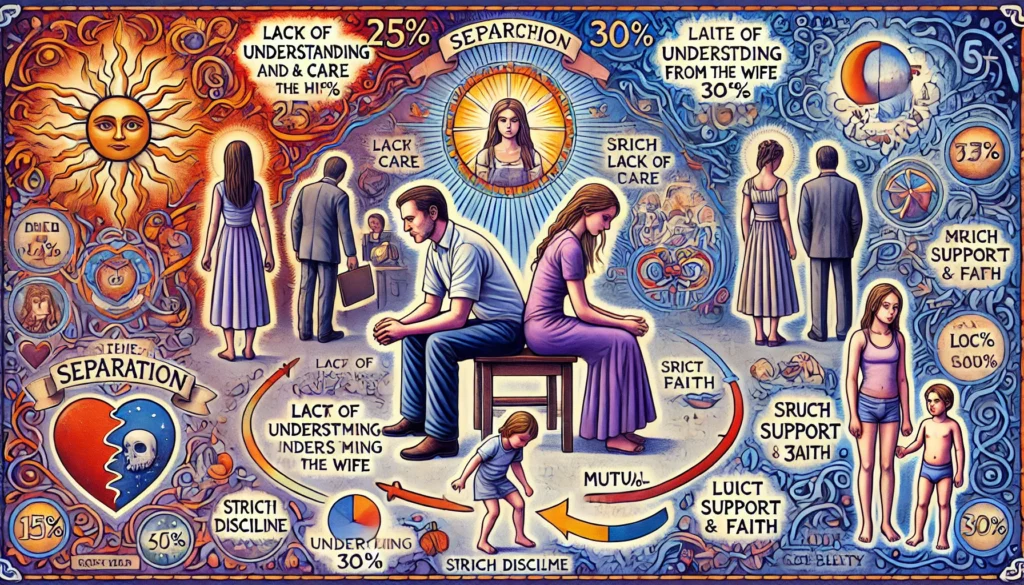应朋友之邀,今天谈一下有关父亲的话题,因个人经历的局限,没法涉及很深的理论依据,只能结合自己的经历和体会来写。同时,也把这个话题摆出来,愿看到的弟兄姐妹与我共同思考。
身为父母的责任
曾经,我也是个孩子。
27年前,父亲因病去世,我成了孤儿。虽然当时母亲仍在,但我依然觉察到了我这么多年来的工作和生活缺少了什么。工作中遇到了难解的人际关系,我得靠自己想办法周旋;人生中的重大事情,无论是值得高兴的、还是让人伤心的,都没办法和他分享。虽然他临终前和我说了今后人生的三点希望,但目前来看我所做的并没有达到父亲的预期。
回想这些年我从小到大的人生,看似有些‘小成绩’,但离自己心中的目标差距太大,充其量也就是在多年的潮流中勉强生存下来了而已。那股阻碍我纵身一搏的力量源自我内心的性格缺陷,今天来看就是没有边界感,做事不知深浅。我曾和周围的朋友说,我性格缺失的根源在于小时候缺少来自父亲的一顿暴打。
事情是这样的:在小学三年级时,大约是1978年,当时生活普遍拮据,我曾和其他三四个同学一起在市场上小偷小摸,被发现后告到了学校,老师接到举报后又通知了家长,而我的父母那时都是中小学老师,本以为放学回家后我会遭受严厉的惩罚,但母亲袒护我,估计也劝说了父亲,所以当晚只是简单批了我一顿,没有进行‘严刑拷打’。这种‘宽松’的处理方式大大超出了我对偷窃和偷窃后必会受到惩罚和毒打的心理预期,因为那时候家长打骂犯错的孩子是非常普遍的一种教育方式。也正是这样的方式让我产生了侥幸心理,为日后的一系列缺乏边界感的错误行为埋下了祸根。

如今,我的父亲当然不会再给我补上这顿教训了,也算是终生遗憾了吧。我常常想,父母结合到一起的时候肯定也不懂应该如何教育孩子,我如今是明白这个常识的,所以他们对我的教育相对于同龄人来讲我认为还是比较成功的,但那次的管教的疏松的确是他们教育的重大失误,父亲当时应该抵挡住母亲的劝说,狠狠的打我一顿,让我长长记性,知道哪些该做,哪些解决不能做,让我今后的生活走正确的路。
我想起了圣经里的一句话,“教养孩童,使他走当行的道,就是到老他也不偏离。”(箴言 22:6 和合本),也许我的父母当时也不知道这句话吧,或是一时心软,不得而知(当‘贫穷’遍地时,也许偷窃也算是一种能力)。如今,无论父母在与不在我们身边,彼此的关系是不变的,我思考更多的是:他们给了我们生命,无论怎样教育我们也总会留下遗憾,在那个年代能把我和弟弟养大成人就已经是他们俩的极限了。如今,哪怕是天天思念都嫌时间不够用,哪儿还会去抱怨他们呢?
因为“儿女是耶和华所赐的产业,所怀的胎是他所给的赏赐。”(诗篇 127:3 和合本),我们的出生是上帝给我们每个人父母的恩赐,我们被教养的责任来自于父母继承上帝给予的一切资源。KJV版本的原文是‘Lo, children are an heritage of the LORD: and the fruit of the womb is his reward.’,要知道儿女是父母得到了上帝的产业做为了自己的奖赏,一代一代的人均是如此。看看我们自己,看看周围的每个人,我们会发现没有一个完全人,每个人都有一堆缺点和不足,父母也不例外,我们当然也不例外。所以,任何一代的‘产业’都需要怀着获得奖赏后的喜悦心情那样认真对待那位颁奖者的期望认真对待。
从那时到现在,我经历了从孩子到大学毕业、工作、成家、又了自己的孩子这一系列的人生过程,所有发生的一切无不在表明,每个人都是上帝眼中独立的个体和奖励。我是来自上帝的赐予,能认识到这一点我已经比父母那一代有了质的提升。所以,每个人都应竭尽全力按天地那位主宰者(耶和华)的带领去生活吧?而不是动不动成为撒但攻击的器具,更不应该狭隘地成为某个特色主义的工具人,难道都要像我刚才说的那样,被暴打一顿才明白这个道理吗?
按上帝的视角看父母责任
在上帝的眼中,每一个孩子都是独特而珍贵的。然而在实际生活中,我们却常常感到缺失,感到不满足。无论是亲情的缺乏、物质的不足,还是情感上的孤独,这些都会让我们感到困惑和痛苦。尤其是父、母的缺失、亲情的断裂,往往会成为我们心中久久的烙印。然而,作为上帝血脉延续的儿女,我们需要思考:我们究竟缺什么呢?这些缺失是否真的超越了对祂的依靠?是否真正理解了在基督里的完全与满足?
这里说明一点,文中提到的上帝和耶稣是圣父和圣子的关系,连同圣灵都是一体的。
缺失的现实
今天重点说的是父亲的缺失、缺位。对于很多孩子来说,父亲的缺失是一种巨大的遗憾。无论是由于实际的离开还是情感上的疏离,父亲的角色在孩子的成长中是不可替代的,他的爱与支持给予孩子们安全感和自信心。
首先,要认识到父亲的离开并不是孩子的过错,而大多是夫妻之间的矛盾和罪性。有了一定信仰基础的人会知道,父母都是罪人,他们大多数情况下缺少共同的信仰根基,对婚姻生活缺乏正确的人生观,只能为了生计和利益去奋斗,同时不可避免地会受到撒但的各样攻击而偏离人生之道甚至夫妻之道;其次,父亲也是一个长不大的男孩,更需要来自妻子细致的关爱和管教,妻子对丈夫也就是孩子父亲婚后的发展方向是起决定性作用的。

反过来说,父亲在婚姻中的过错、双方疏远、乃至最终离开家庭的责任不仅仅是父亲的,很大程度是缺乏妻子理解(占25%)和关爱(占25%)的结果,其他还有对丈夫的管教(占30%)等。丈夫(父亲)恰似妻子(母亲)的第一个‘孩子’,他要在妻子(母亲)这所学校里从幼儿园学起,直到事业有成才算将家庭稳定住。丈夫(父亲)对妻子(母亲)的关爱、理解和陪伴也同样重要,今天就不在此赘述了。出现父母分离的情况,是双方矛盾的激化点,如果又缺乏一致的信仰,那就无法在爱的视野里省察各自的罪性,只剩下各执己见、一拍两散。理解这一点,做为孩子应该可以放下对自己的责备,理解已发生的现实,用心去经营上帝的产业。
除了父亲,其他亲情的缺失也会给人带来痛苦。亲人的离世、家庭的分裂,都会让人感到孤独和失落。这种缺失感往往伴随着痛苦和无助,影响人的心理健康和情感状态。物质的缺乏同样是现实生活中的一个重要问题。缺乏经济支持、生活资源不足,会让人感到压力和焦虑。物质的不足不仅影响生活质量,更容易被撒但诱惑,比如我小时候发生的那件事。
世人的标准与罪的根源
作为基督的门徒,我们需要问自己:这些缺失是否真的超越了我们对耶稣的依靠?门徒总会心心念念地按照世人眼里的标准来衡量自己应该拥有什么东西和其他人的认可,却忽略了我们做为上帝的恩赐和祂产业的拥有者所具备的先‘天’条件。仅凭这一点,我们的思想境界便会突破绝大部分世俗的标准和期望,躲避罪的搅扰。
人在年轻力壮的岁数很难做到依靠信仰去生活,我是在35岁时因着经历了生活中的另一件挫折而转向了对耶稣基督的依靠。在此后的20多年时间里,一直在靠自己的智慧和依靠上帝的带领之间反复徘徊、争斗,直到我用尽了自己所有的聪明才智方才明白信靠祂的含义究竟是什么。直到我生命中最重要的两个人相继离去后,我不再有可以依靠的人、凡事需要我自己做决定、自己承担结果时,我才忽然明白了在我生命中有‘人’一直在默默的保守我,祂在我无助的时候安慰我、鼓励我,托住了我不断下沉的身体和灵魂,激励我活出生命中快乐的自我,将祂赐予的产业推向繁荣的轨道。

这股力量的源泉就是上帝的带领,祂在我经历了那么多的坎坷后始终不离不弃,“我从前风闻有你,现在亲眼看见你。”(约伯记 42:5 和合本),从‘风闻’到‘亲眼看见’,这之间仅仅隔了一层~~~那就是自己的内心的骄傲和怨恨。总以为自己有能力有办法解决遇到的难处,不愿静下来聆听祂的劝慰。
在‘风风雨雨的时候,才知道祢的温柔’这篇文章里我提到了悔改也是这个意思,无论何时,当人愿意愿意成为祂的儿女、愿意放下自己的骄傲、埋怨的情绪、在祂面前悔改时,我们的主耶稣便会把真正的满足和安慰交给我们,无论面对什么样的缺失,依靠耶稣,我们会用感恩的心看到祂在我们生命中的祝福,会在帮助他人时找到更多的满足和快乐,会在祂的话语中得到心灵的平安和灵魂的安慰。《诗篇》23:1说:“耶和华是我的牧者,我必不缺乏。”,只要我们信靠主,祂会供应我们需要的一切。
所谓父、母的缺失、亲情的缺失、物质的缺失何尝不是撒但的一种谎言?

结语
门徒们,孩子们,你们究竟缺什么呢?我们所缺的,无论是亲情、物质还是其他,都无法超越我们对耶稣的依靠和敬拜。只有在祂里面,我们才能找到真正的满足和平安,成为祂所喜悦的子民。追求世俗的标准和认可,只会让我们远离真正的满足和幸福。让我们回归信仰的根基,依靠耶稣,在祂的爱中找到我们所需要的一切。
请弟兄姐妹们一起为此祷告!
如有问题请联系[email protected]。
Child, What Is It That You Still Lack?
At the invitation of a friend, today I want to address a topic related to fatherhood. Due to the limitations of my personal experience, I cannot delve deeply into theoretical foundations; instead, I will share my own experiences and reflections. I also wish to put this topic forward so that any brothers and sisters reading it might reflect on it with me.
The Responsibility of Being a Parent
I too was once a child.
Twenty-seven years ago, my father died from an illness, and I became an orphan. Although my mother was still with me, I gradually sensed that something was missing in my work and life all those years. When I encountered difficult interpersonal relationships at work, I had to figure things out on my own; on major occasions in life—whether joyful or sorrowful—I had no one with whom to share. Though before his passing my father expressed three hopes for my life, I have come to feel that what I have done so far has not met his expectations.
Reflecting on my life from childhood through college, work, and even as a parent myself, I realize that while I may have achieved some “small successes,” I remain far from the goals stored in my heart. At best, I have merely managed to survive amid the currents of the times. The force that has held me back from taking bold steps comes from a defect in my own character—in my case, a lack of boundaries and a failure to grasp the depth and limits in what I do. I once told my friends that the root of my character deficiency came from the fact that I lacked a proper, firm correction from my father when I was young.
Let me explain: In about 1978, when I was in the third grade of elementary school, life was generally frugal. I, along with three or four other classmates, engaged in petty theft at the marketplace. When we were caught, the incident was reported to school, and the teacher contacted our parents. Both of my parents were teachers at that time, so I expected a severe punishment after school. However, my mother shielded me—and perhaps persuaded my father as well—so that the punishment that night was merely a brief scolding instead of a harsh beating. This “lenient” treatment far exceeded my expectations of punishment for stealing—a punishment that, back then, often involved beatings for misbehaving children. That experience instilled in me a sense of luck and helped sow the seeds for a lifetime of lacking appropriate boundaries.

Now, my father certainly cannot provide that missed lesson anymore—and that remains a lifelong regret. I often think that perhaps when my parents were together, they did not fully understand how to educate a child. I now realize what common sense demands. Compared to many of my peers, I believe I was relatively fortunate in my upbringing. Yet that one instance of lax discipline was a major error in their approach. My father should have resisted my mother’s pleas and given me a firm beating to teach me a lasting lesson about what should and should not be done—ensuring that my future path would be more righteous.
I recall a verse from the Bible:
“Train up a child in the way he should go, and when he is old he will not depart from it.” (Proverbs 22:6, Chinese Union Version) Perhaps my parents did not fully grasp this saying at the time, or they might have softened their stance in that era when poverty was widespread—when even theft could be seen as a kind of “ability.” Today, regardless of whether our parents are with us or not, our relationship with them remains unchanged. I have come to realize that they gave us life. No matter how they educated us, there is always some regret. In that era, merely raising my brother and me to adulthood was probably the limit of what they could manage. Today, even if we spend every waking moment missing them, how could we even find it in our hearts to complain about them?
For it is written,
“Children are a heritage from the LORD, offspring a reward from him.” (Psalm 127:3, Chinese Union Version) Our very existence is a gift from the LORD to our parents. The responsibility of our upbringing comes as an inheritance from God. (The KJV reads: “Lo, children are an heritage of the LORD: and the fruit of the womb is his reward.”) Know that every generation’s “inheritance” must be treated with the same joy and seriousness as receiving an award from the One who bestows it.
From childhood through college, work, marriage, and having my own children, every stage of life has demonstrated that each person is a unique individual and a reward in God’s sight. I was given by God—and realizing that fact has elevated me in quality compared to my parents’ generation. Therefore, every person should strive to live fully under the guidance of the Lord, the Ruler of heaven and earth. We must not simply become an instrument for Satan’s attacks or narrowly serve as a tool of some particular ideology. Must we wait until we receive a hard lesson—such as a severe beating—to learn this truth?
Viewing Parental Responsibility from God’s Perspective
In God’s eyes, every child is unique and precious. Yet in real life, we often feel something is missing—be it the absence of parental affection, material insufficiency, or emotional loneliness—all of which can leave us confused and in pain. The absence or breakdown of a father’s or mother’s role often leaves an indelible mark on our hearts. But as children of God, we need to ask ourselves: What is it that we truly lack? Do these deficiencies surpass our reliance on Him? Have we come to fully understand the completeness and satisfaction that comes from being in Christ?
I want to focus today especially on the lack or absence of a father. For many children, the absence of a father is a great regret. Whether due to physical absence or emotional distance, the role of a father in a child’s growth is irreplaceable; his love and support grant children security and confidence.
First, it must be recognized that a father’s absence is not the child’s fault, but rather often the result of marital strife and human sin. Those with a foundation of faith understand that parents are sinners too. More often than not, they lack a shared foundation in faith, and their views on marriage are skewed; they are forced to fight for a living and personal interests, and inevitably, they succumb to various attacks from Satan and stray from God’s way. Secondly, a father is also a man who is never fully grown—he needs meticulous care and discipline from his wife. A wife’s influence on her husband, the father, is critical in shaping his marital development.

In many instances, the fault for a family’s breakdown is not solely the father’s; it is often partially due (say 25% to a lack of understanding from the wife and 25% to her lack of care, along with another 30% related to how she disciplines her husband). A husband (or father) is, in many ways, like his wife’s first “child”—he must start learning at her “school” from the beginning until he matures enough to stabilize the family. The care, understanding, and companionship that a husband receives from his wife are equally important. I need not elaborate further here, but know that the separation of parents is usually the culmination of escalating conflicts. Without a unified foundation in faith, neither party can honestly examine their own sinfulness out of love; all that remains is obstinacy and a painful split. Understanding this should allow children to let go of self-blame, accept the reality as it has unfolded, and work earnestly to steward God’s inheritance.
Beyond the absence of a father, other familial deficiencies—such as the death of loved ones or family fragmentation—also bring pain. The sense of loss, whether emotional or material, breeds loneliness and despair. Material insufficiency itself is a significant issue, leading to financial pressures and anxiety. The lack of economic support and life resources not only affects one’s quality of life but also makes people vulnerable to Satan’s temptations, like the incident of my own childhood.
The Worldly Standard and the Root of Sin
As disciples of Christ, we must ask ourselves: Do these deficiencies truly surpass our reliance on Jesus? Too often, disciples are weighed down by the world’s standards, measuring what they should possess and seeking the approval of others. In doing so, we overlook that we are the recipients of God’s grace and the heirs of His inheritance. Recognizing this alone can lift our perspective beyond most secular expectations and help us evade the snares of sin.
In our youthful years, it is challenging to live a life based solely on faith. I reached a turning point at the age of 35, when a significant setback in life led me to depend on Jesus. For more than 20 years afterward, I vacillated between relying on my own wisdom and on God’s guidance. It wasn’t until I lost the two most important people in my life that I realized I had no one else to rely on—every decision, every consequence fell squarely on my shoulders. Then, I suddenly understood that there had been Someone silently protecting me all along. In my despair, when my body and soul were sinking, He comforted and encouraged me, strengthening me to live joyfully and to drive the blessings He had given me toward prosperity.
That source of strength is God’s guidance. Even after all the trials, He has never forsaken me. “I had heard of You, but now I have seen You with my own eyes.”
(Job 42:5, Chinese Union Version) Between “hearing” and “seeing” lies a barrier—the barrier of one’s own pride and resentment. I had always assumed I could solve my problems through my own ability and was unwilling to stop and listen to His counsel.
In my previous article “Only in Storms Can We Truly Know Your Tenderness,” I noted that repentance carries a similar meaning. Whenever we choose to become the children of the Lord, when we set aside our pride and complaints and come before Him in repentance, our Lord Jesus will grant us the true satisfaction and comfort of life. No matter what we lack, if we depend on Jesus, our hearts will be filled with gratitude as we recognize the blessings He showers on us. We will find greater satisfaction and joy in helping others, and in His Word our hearts and souls will find peace and solace. As it is written in Psalm 23:1:
“The LORD is my shepherd; I shall not want.” As long as we trust in the Lord, He will supply everything we need.
In this light, could it be that all our feelings of lacking—whether for parental love, material wealth, or other forms—are nothing more than Satan’s lies?

Conclusion
My dear disciples and children, what is it that you truly lack? No deficiency—be it in family, material wealth, or anything else—can surpass our reliance on and worship of Jesus. Only in Him will we find true satisfaction and peace, becoming the people He delights in. Chasing worldly standards and the approval of others will only distance us from genuine satisfaction and happiness. Let us return to the foundation of our faith, relying on Jesus, and find in His love all that we need.
Please, dear brothers and sisters, join me in prayer for this!

发表回复